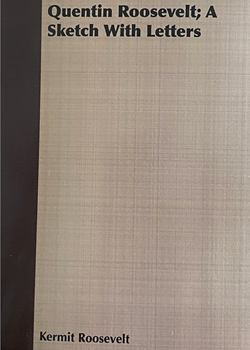Quentin Roosevelt; A Sketch with Letters (and poetry)
- Home
- World War I Book Reviews
- Quentin Roosevelt; A Sketch with Letters (and poetry)

Edited by Kermit Roosevelt
Illustrated
New York Charles Scribner's Sons 1921
(Facsimile)
From the start, there is a sense of tragedy; you know that this is a collection of letters sent by someone serving in France who will die. Though a collection of letters, this is an easy read with a clear and completed beginning, middle and end, providing insight into the life, times and death of a young American transport officer, flying instructor, and fighter pilot.
It is rather like rewatching the original film version of ‘All Quiet on the Western Front’ - you know that it ends with a shot and the protagonist’s death - though in the case of Quentin Roosevelt, it was reportedly two shots through the head while fighting off three German aeroplanes that ended his war.
The 20-year-old Quentin Roosevelt was a white American with money and contacts who could take a motorbike apart or fly his plane up and down France. Often, he was on a mission to secure supplies for his depot; at others, he was visiting family or friends.
The letters are full of joy, ambition and optimism. They were primarily written to his older brother Kermit, his sister Ethel, and his father. What comes over is Quentin’s love of people and a humble, non-pushy way of getting on with the job at hand, no matter what it was and no matter that he was the son of a former US President. His way with men and ability to get through the red tape and secure supplies for the truck depot he ran and then at a training airfield made his superiors eager to keep Quentin from a combat role.
The frequency of Quentin's excitable and detailed letters to his older brother Kermit could have as quickly been the first draft of a memoir, taken almost verbatim, had Quentin survived. He lived life to the full and had the money for motorbikes, cars, and planes while in his late teens and early twenties. He knew of France from previous visits, and as the son of the former President of the US, his name carried a little weight and influence, no doubt.
A little infill is provided between the many letters Quentin wrote home from France in 1917 and 1918. For the most part, these were written to his brother with one or two letters, and he also wrote to his sister and father (though never to his mother). In the opening pages, we are introduced to Quentin, the youngest child of President Theodore Roosevelt, who was only a four-year-old boy when the family were living in the White House. (1901 to 1909)
After Groton, in the fall of 1916, Quentin went to Harvard at age 19. He lasted a single term as he intended to get to France to join the ‘European War’ as soon as possible, ideally in a combat role. He eventually made it to France, working in the transport section as a transport officer from April 1917.
His letters home give us a candid, on-the-spot view of France and the Western Front during the First World War. We are behind and above the lines (he flew and had his plane) from the perspective of a privileged, energetic and gregarious 'man's man'. Quentin had a knack for getting the best out of others. He was held in jobs where he excelled: for example, running 50 trucks out of a supply depot, helping to set up one of the first AEF aerodromes and once he had passed through with flying colours - running a flying school, and all of this age just 20 and why his seniors wanted to keep him in these roles. He had a reputation for tackling challenging tasks that required ‘sensitive handling’, for example, getting around the issue on one occasion where a pig-headed captain in stores blocked a requisition of boots - Quentin ordered the shoes himself and took a man and two trucks out to go and collect them.
He craved to fly in combat, if not with the American Air Force, then with a French or British Squadron. The son of a president with an excellent reputation, he could pull strings to get the posting he wanted, but this took time. His ability to get things done was so great that his seniors were reluctant to lose him. His men were sad to see him go when he finally got his way. A star pupil went through flying school, in target practice, and practice dog fights, but it wasn't long before he got into scraps over the German Lines.
Inevitably, and we feel it with growing dread as we read the book, we know he will be killed. Just a month into a combat role, with one 'victory' to his name, he finds himself set upon by three German planes flying an inferior machine and is shot down. He also describes on several occasions how men went missing, their final hours and how they were remembered, as well as the burials of French Ace Guynemer and German Ace Baron von Richthofen which were marked with 'full military honours', so foreshadowing how he, Lieutenant Quentin Roosevelt, would be honoured inside German lines when buried by the Bosche, and how he would be celebrated again a few weeks later by his side once the German lines had been overrun.
If ever a 'great life' not led could be hinted at, here it is. Close to his brothers and sisters, a keen and frequent letter writer, they are published here to give a remarkable insight into life behind the lines over the 11 months he was there before his death.
Review by Jonathan Vernon, Digital Editor, The Western Front Association





